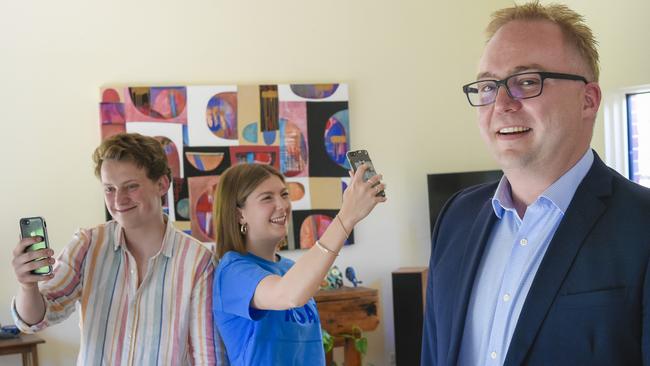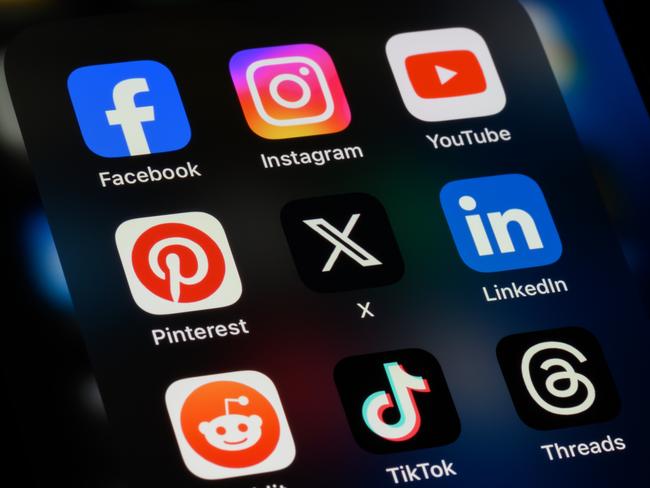Psychologist explains why raising minimum age can reduce social media harm
One blanket, minimum age to access social media for all Australians will spare parents, schools and young people themselves from unintended negative consequences of a two-tier system, argues Dr Simon Wilksch.
National
Don't miss out on the headlines from National. Followed categories will be added to My News.
A letter signed by 120 clinicians and experts was sent to every federal MP and Senator last week calling for changes to social media, including: raise minimum age to 16 years; introduce age verification; improve the Online Safety Act; roll-out evidence-based mental health prevention programs to young people; and, improve support for parents and schools.
I am a psychologist providing treatment to people experiencing eating disorders, a researcher who has developed effective prevention programs, and a parent.
I am grateful to SA Premier Malinauskis for his leadership in initiating the report by the Honourable Robert French AC. I commend the Prime Minister, opposition and other premiers for expressing that they will act on increasing minimum age.
The question is, what will this minimum age be?
This requires bipartisan, national support. One system for all of Australia.
It must be 16 years. For three reasons.
First, I know of no research evidence that social media is safe for children under 16.
There is substantial evidence of harm however. This includes a large study that found greatest risk for girls using social media was when they were 11-13 years-old, and for boys it was 14-15 years. The US Surgeon General has stated there are “ample indicators that social media can have profound risk of harm to children and adolescents”.
The list is long and, in addition to poor mental health, includes: cyberbullying, sextortion, predatory behaviours, misogynism, and concentration difficulties.

Not every moment of social media is harmful. However, this is also true for other restricted products such as MA15+/R18+ movies, gambling, or a driver’s license.
These products are restricted by age not because all young people will be harmed by them, but because the evidence shows a significant proportion will be. We are clearly at this point for under 16-year-olds, where the risks of harm are unacceptably high.
Second, our mental health system, including hospitals, cannot cope with the exponential increase in poor mental health. For example, a 200% increase in 10 to 14-year-olds experiencing an eating disorder over the last 12 years strongly overlaps with the rapid growth in social media use by children and ever-increasing sophistication of algorithms and other addictive features.
Thus, raising minimum age to 16 is a necessity for arresting this decline in youth wellbeing and all the economic and societal costs that are associated with this.
Parents need to take an average of 14 working weeks off to support their child to recover from an eating disorder with a devastating toll on their own physical and psychological health.

Third, while well-intentioned, a system of ‘parent consent’ for 14 and 15-year-olds proposed in the French report will create two problems for parents.
First, it fails to communicate the serious risks of social media. This would continue the current problem where some parents think that because their child’s friends are on it, it must be OK.
Second, those parents who are concerned and choose not to allow their child to use it will be left in the difficult position of their child feeling distressed and left out.
One blanket, minimum age for all young Australians will spare parents, schools and young people themselves from unintended negative consequences of a two-tier system.
The evidence suggests the “later the better” when it comes to first using social media.
While life will always have moments of suffering, there are times of ‘preventable’ suffering that we can do something about. If we take decisive, bipartisan action, we will hopefully look back at this time as the point when mental health started to improve.
Let’s get this done – set the minimum age at 16, invest in evidence-based programs that prevent and reduce suffering, and greatly increase support for our parents and schools.
Dr Simon Wilksch is a Senior Research Fellow in Psychology (Full Academic Status) at Flinders University and Clinic Director at Advanced Psychology Services.
More Coverage
Originally published as Psychologist explains why raising minimum age can reduce social media harm
Read related topics:Let Them Be Kids




